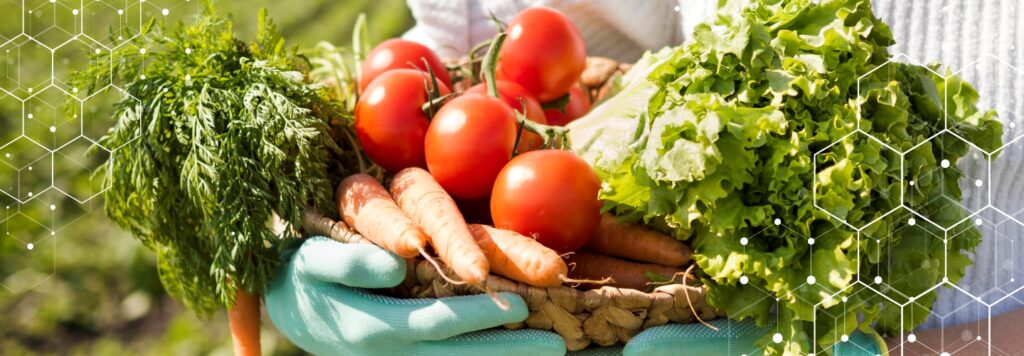Future of Farm and Food: Significance of Agriculture Management Systems

Earlier, farmers would only plant crops based on what they thought would be successful. However, today, it is more than just producing crops and farm operations are becoming more business-oriented. Rather than just being good producers, farmers now need to address soil fertility, crop profitability, agribusiness resilience, and sustainability to name a few.
Every single modern agribusiness has a lot of components involved, in addition to sowing seeds and harvesting crops. A farm business needs management of land preparation, crop production methods, farm machinery, inventory, record keeping, and many others. It is a crucial component in determining the longevity of an agribusiness.
Productive Farm Management – A Necessity for Agribusiness Success
How do we define farm management? It is the process of planning and implementing various tasks in farming to achieve efficiency and profitability. Every farm management approach and practice depends on the type of land, climatic conditions, seasons, farming needs of different types of crops, and others. Furthermore, successful agricultural management needs to be aware of farm policies, market prices, agricultural economics, sustainability measures, etc.
Various agriculture management systems work in coordination to make farms more productive, sustainable, resistant, and profitable. It also determines how resources will be allocated, activities performed, and multiple farm management. With agriculture management systems, farmers can further monitor their performance and understand what changes should be made to revolutionise their business to stay ahead of the curve.
Significant Opportunities in Understanding the Farmland and Planning
Both crop planting and cultivation require careful farm planning. As land is the most important asset in farming, understanding it gives insights into its fertility, pH levels, etc. Subsequently, this helps farmers plan better on the types of crops to be sown in a specific part of the land to produce maximum yield.
The agriculture management system collects and analyzes data from the farm and offers a planning feature. This feature determines the type of crops, quantities of fertilizers required, the time of application, and appropriate pest control. The system further suggests how and when to conduct different farm activities. Moreover, a planting routine can be well coordinated with soil preparation and crop protection measurement with weather conditions.
Efficient Farm Optimisation Through Analysis
An agriculture management system keeps farm records updated electronically which gives farmers better control of their farms and operating equipment. With these records and calculation of certain data, new opportunities for analyses are developed which leads to new farm optimisation opportunities.
The farm management system enables to efficiently monitor the application of fertilisers and pesticide amounts with only one click, as well as keeping legal limits and master resistance management. Additionally, electronic data records can be transferred to other systems for comparison with other agribusinesses and identification of weak spots to be eliminated with effective measures.
Better Resource Evaluation and Risk Management
In modern farming, farmers rely on a farm management system to gather data on land, water, labour, plants, and renewable resources to plan their uses in an efficient way that produces the optimum result. It also evaluates the relative performance of various farm machinery used in carrying out different farm operations.
Farmers often encounter external risks, most recently climate change, that cannot be controlled. Therefore, it is important to track the weather conditions and pests associated with a particular season to prepare for calamities and avoid any potential damage. With an ability to collect and analyze a wealth of data, an agriculture management system helps farmers in managing risk better. It further warns the farmers about any potential dangers that may affect the crops.
Cost and Profit Analysis
Planned and managed farms ensure that resources are used efficiently and yields are maximized. Proper farm management systems monitor the farms, even in remote locations, and provide cost and profit per hectare, thus opening up new opportunities to analyze and make better decisions. Moreover, a well-informed plan for different processes of farming helps determine when labour needs will arise, which helps in eliminating unwanted costs.
Agriculture management systems further support sustainable farming practices, as the use of pesticides decreased resulting in fewer chemicals added to the soil and mixed in water streams. Careful use of resources not only makes farming cost-efficient but also sustainable.
Inventory and Logistics Management
As the global demand for food increases consistently, inventory and logistics management becomes even more important in ensuring that agriculture production and food supply run smoothly. Inventory management in agriculture provides an overview of stock, allowing sales and purchases to be done on time. Logistics management, on the other hand, ensures the optimal and continuous flow of agro-goods from farmers to suppliers and retailers.
All inventory management and logistics activities must be effectively managed to meet the demands on time and achieve maximum value. Agriculture management systems play an important role in such management. Moreover, it is necessary to minimise unnecessary damage or losses of products and improve the circulation of agricultural goods.
Impact of Emerging Technology on Agriculture Management Systems
Today, farmers and agribusinesses are taking advantage of several technologies in farm management to increase their profit and relevance in the industry. Some of these technologies include enhanced broadband access, precision farming technologies, robotics and automation, artificial intelligence, 3-D printing, big data, and the internet of things.
Precision farming technologies rely on various sensors and information technology, allowing farmers to collect and utilize precise data about their fields. Precision agriculture and information technologies such as soil and yield maps, automated guidance systems, and variable rate input applications allow farmers to fine-tune their production practices. In addition to contributing to financial profitability, precision farming technologies influence better risk, machinery, and land management.
The wealth and increasing role of new technologies as farm size increases augment the importance of agriculture management systems. FarmERP offers exclusive farm management software that covers various components of agribusiness to boost farmers’ bottom-line profits. Reach out today to know more.
